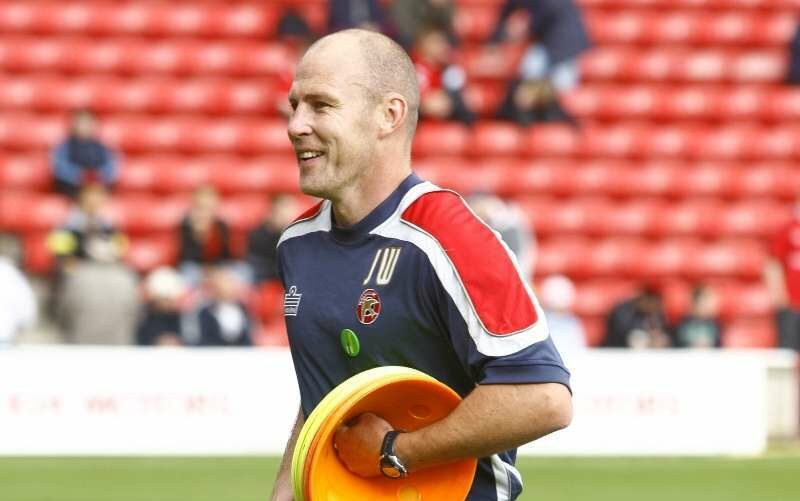BRIAN LITTLE once said that Jon Whitney would have been a top-flight player if he'd been around in the Seventies.
The Hull City fan site, Amber Nectar, put it less tactfully. “Hull fans did not love Jon for his technical ability,” said a glowing entry of the man who played 57 games for the Tigers. “Rather for unvarnished, brute thuggery, delivered with charisma and a wry smile.”
Less no-nonsense, more no mercy, Whitney was the Roberto Duran of defending: all bludgeoning force and blunt trauma.
Red cards, yellow cards, man and ball. “If you asked me to pick a side of the greatest players I've ever played with, Jon might not get in it,” said Gary Brabin, who played alongside Whitney in the Hull side that heroically escaped relegation to the Conference in 1999.
“But, if you were picking a team of men to go to war with, he'd be the first name down – and I'm sure he won't mind me saying so.”
Whitney's uncompromising, nihilistic approach was born of a knowledge that he was living on borrowed time.
Rejected by Wigan and rejuvenated by Non-League Winsford, he was 22 by the time Neil Warnock and Huddersfield offered him a second chance at the pro ranks.
Yet, just two months in, Whitney snapped his cruciate ligament. Treatment was botched, recovery slow and a specialist eventually suggested the full-back retire in order to save his knee joint. “I'd just made my dream move and I refused to accept it,” he said. “I was prepared to play through anything, even if it was a case of having an operation every year to put me right.”
And it almost was. Every year brought fresh injury, some minor, some major. Each season was more of a grind. Like an un-oiled motor, Whitney gradually seized up. But with the pain came purpose.
One product was a determination to squeeze the pips out of his career, resulting in the kind of all-or-nothing performances that earned hero status at Lincoln City and Hull.
Signed by the Imps in 1996, he won promotion from the Third Division two years later and played more than 100 matches.
“My time at Lincoln under John Beck was the best of my playing career,” says Whitney, whose son Luke was born in the city. “The team morale was out of this world. It was a high-energy and enjoyable place to be at that time and, although some of John's methods were seen as unconventional, they did have the desired effect.”
At Hull, he was one of several hardened veterans who arrived midway through the 1998-99 campaign to salvage a place in the Football League, then battled through financial meltdown following the collapse of ITV Digital.
“It was a tough situation, but we had some strong characters,” said Brabin. “And Jonny was one of those. His enthusiasm was infectious. He'd run through brick walls. He was hard as nails. He gave you everything and demanded it from everyone else.”
Among his many morale-boosting party pieces was a pre-match warm-up routine which involved eating worms plucked from the pitch.
Yet, if Whitney's injury woes fuelled performances on the pitch, they also sparked academic interest off it.
 The FLP's weekly profile is sponsored by Marathonbet: Odds here https://www.marathonbet.co.uk/en/
The FLP's weekly profile is sponsored by Marathonbet: Odds here https://www.marathonbet.co.uk/en/
At 25, he took a diploma in the treatment and management of injuries. Next came AS levels. Then, when injury finally finished him aged 30, he started a degree in physiotherapy at Salford University.
Unfurnished by Premier League wages and studying full-time, Whitney made ends meet by working for his father's undertaking business.
“I did all aspects,” he said in 2005. “Grave-digging, driving the hearse, visiting the mortuary and everything. It was an eye-opener. I was quite philosophical before, but you could see the pain people were going through.”
Whitney's big break came in 2003. Seeking a northern scout, Walsall boss Colin Lee asked Beck for a recommendation. He suggest Whitney. Six months later, the Saddlers needed a physio and the former full-back “talked myself into a job”.
Over the course of the next decade, a string of managers would hail his pioneering work.
“Jon works extremely hard and all credit to him that the players tend to come back quickly after injury,” said Chris Hutchings. “Nobody could be more dedicated to his job.
“He is working with the players morning and afternoon, sometimes at the swimming pool from eight in the morning, before getting into the treatment room at ten then training in the afternoon. He is a great professional.”
Ben Purkiss, now at Port Vale, said: “Whitters is always at the forefront of what's going on in the world of strength and conditioning. He does an awful lot of research and is always coming up with new ideas to keep things interesting and current. The players love him.”
Most recently, Whitney has pioneered a conditioning programme called FAST, a system based on biomechanics that eliminates imbalances and minimises the risk of injury.
The man Little described as a relic is now at the cutting edge of sports science and, since the departures of first Dean Smith and then O'Driscoll, a League One manager.
“People surprise you sometimes,” said Brabin. “When he was a player, he was always interested in the physio side. That was his passion and I always thought he'd excel by going down that path.
“Management wasn't something I ever expected. Now, I'd say he's got all the ingredients to do it. He's got the enthusiasm, the work-rate, and, most of all, the personality to inspire.”


















his selection of the team in the first game cost walsall the playoffs, hes nieve and far too critical on the players, he wont last two months,he has no class,